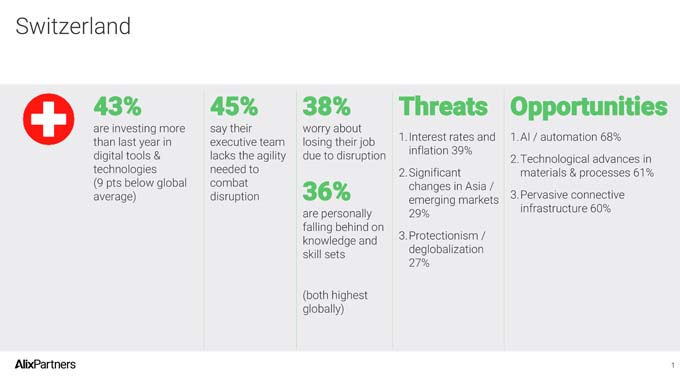Survey: Swiss innovative strength faces AI challenges
Ongoing concerns about supply and trade chains as well as the availability and prices of raw materials have dominated economic development in recent years - including in Switzerland. However, according to a recent study by the international consulting firm AlixPartners, this is likely to change: The mega trend of artificial intelligence is continuing to fuel the innovation plans of Swiss companies, as the results of the latest AlixPartners Disruption Index 2024 show.

"The topic of AI is already playing a significant role in many companies, and we are only just at the beginning in this respect. In the coming months, 43% of Swiss managers intend to increase their investments in digital tools and technologies compared to the previous year. In addition, AI is seen as a driver of change for well-known problems in many business areas, including the supply chain," says Beatrix Morath, Managing Director and Country Lead Switzerland and DACH Co-Lead at AlixPartners.
AI increases companies' willingness to innovate
According to the study, for which over 3,000 CEOs and executives from various industries worldwide were surveyed, including almost 200 from Switzerland, AI is a very present topic: 51% already regularly rely on the use of AI and 58% are optimistic that it will have a positive impact on their company in the future. This is because the increasing presence of AI is also contributing to the supply chain problems that have been driving companies around the world in recent years: Over a third of Swiss companies are investing in digital solutions to stabilize supply chains. In addition, AI is expected to help automate forecasting and optimize sales planning in the future. AI is also having an impact on cyber security: "Awareness of cyber security is growing continuously, as AI naturally also increases the risks in this area," explains Beatrix Morath.
"All these developments hold great potential. If implemented correctly, they can result in real competitive advantages. But it all depends on the determination of companies. In an international comparison, especially with Germany, we can see that Switzerland is ahead of the game and sees these topics as an opportunity. Actions must now follow in order to defend Switzerland's status as a driver of innovation, particularly with regard to the Asian market," emphasizes Morath.
Reluctance hinders digitalization and transformation progress
The survey also shows that the Swiss economy is still in a dilemma: while Switzerland is regarded as a spearhead of innovation, caution and security concerns remain high. Only 26% of Swiss companies are currently actively driving forward the transformation of their business models, while the majority are merely reacting to changing circumstances. This reluctance is also reflected in the fear of the Swiss for their jobs: at 38%, they consider their jobs to be the most at risk from disruptive developments in a country comparison. A further 36% at least fear that their technical skills will not be able to keep pace.

"The continuing uncertainty surrounding the economic situation is also fueling the caution of many companies. And this can certainly pose risks in terms of international competition," as Managing Director Karsten Lafrenz analyzes. "In an international comparison, Switzerland is particularly pessimistic. Less than half are positive about the future in terms of a recession, whereas in China, for example, this is only the case for around a third of respondents." The expert also warns of the effects of increasing uncertainty on competitiveness. Too many managers are still preoccupied with the possible 'day after tomorrow'.
"However, in order to survive tomorrow, companies must constantly question their status quo and align it with the dynamic developments in our world. In the global struggle for market share, particularly with the emerging forces of Asia and the emerging markets, Swiss companies face the challenge of consistently driving their transformation forward - holistically, without compromise and at all levels," summarizes Lafrenz. This also means that refocusing on domestic markets will become increasingly important. According to 27% of the Swiss, deglobalization is one of the top three challenges for the domestic economy in the coming months. According to the experts, this is also accompanied by the fact that more than a third of those surveyed expect changes in the geographical location network of their companies - this particularly affects Swiss companies, not least due to the fact that their economic structure is strongly characterized by internationally operating groups.
Source: www.alixpartners.com









